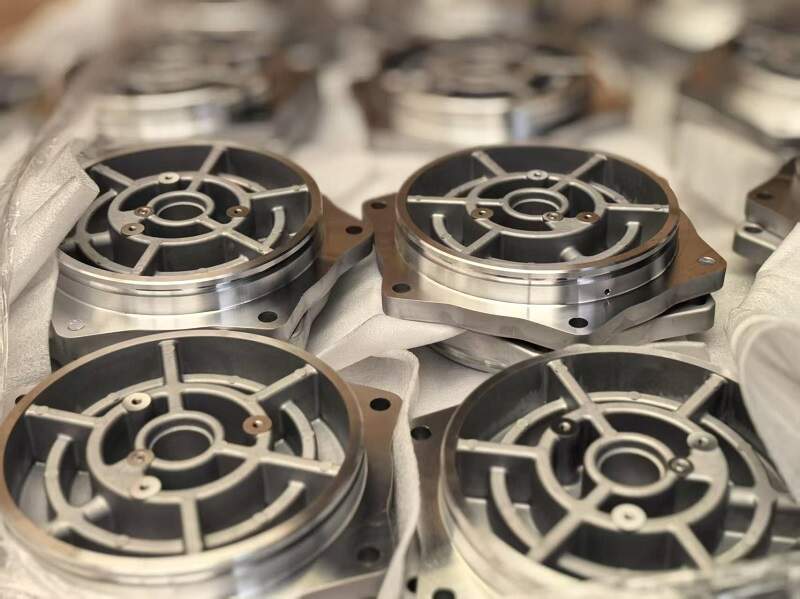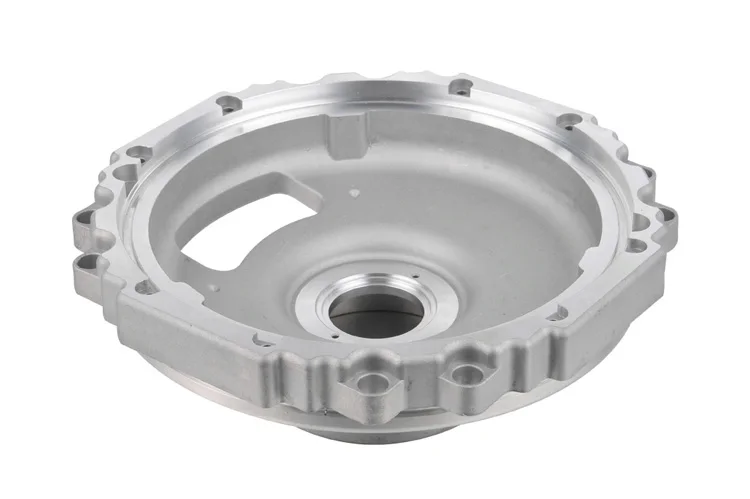The leading reasons why aluminum casting remains in high demand
Wiki Article
Checking out the Duty of Foundry Providers beforehand Modern Design Solutions
Factory solutions are important in forming contemporary engineering options - Aluminum Casting Company. They connect the void in between standard manufacturing strategies and the demands of contemporary industries. With innovations in automation and sustainability, factories are progressing to fulfill the demands of sectors such as aerospace and automotive. This improvement elevates inquiries concerning the ramifications for products, processes, and future advancements. What possibilities and obstacles exist in advance for shop solutions in this swiftly transforming landscape?The Evolution of Factory Solutions in Design

The assimilation of computer-aided layout (CAD) and simulation software application has actually changed the style and manufacturing procedures, making it possible for foundries to generate intricate geometries with higher precision. The shift towards environmentally friendly methods has actually led to the adoption of greener modern technologies and reusing efforts within factories. As sectors significantly prioritize customization and rapid prototyping, factory services have actually expanded their capabilities, ensuring they stay necessary factors to the design landscape. This advancement emphasizes the foundry's vital role in sustaining advancements across different fields, including automotive, aerospace, and power.
Key Processes and Strategies in Modern Foundries
Modern factories employ a range of crucial processes and methods that enhance the performance and top quality of metal casting. Among these, sand casting continues to be common because of its adaptability and cost-effectiveness. Making use of innovative innovations, such as computer-aided style (CAD) and computer-aided production (WEBCAM), permits for precise modeling and production, ensuring high accuracy in component measurements. Furthermore, financial investment spreading is favored for creating intricate geometries with outstanding surface finishes.Automation and robotics enhance manufacturing rate and consistency while lowering labor costs. Techniques like additive manufacturing are significantly incorporated to produce detailed molds and cores, thus lessening material waste. The application of thermal analysis help in optimizing casting processes by managing and predicting solidification habits. Collectively, these processes and techniques exemplify exactly how modern-day foundries are adapting to satisfy the demands of contemporary engineering obstacles, making sure remarkable item high quality and operational efficiency.
The Significance of Products Choice in Foundry Services
Picking the appropriate products is vital in shop solutions, as it straight affects the mechanical homes, toughness, and general efficiency of the end product. Various products have special attributes, such as tensile stamina, corrosion resistance, and thermal security, which must align with the designated application of the cast parts. As an example, steels like aluminum and steel are often chosen for their strength-to-weight ratio, while alloys can improve specific efficiency characteristics.Additionally, the choice process entails taking into consideration elements such as schedule, manufacturability, and expense, which can especially influence task timelines and budgets. Additionally, improvements in material science allow the growth of innovative composites and specialized alloys that satisfy arising design difficulties. A complete understanding of product residential properties and their ramifications is crucial for designers and foundry specialists to attain effective outcomes in their projects. This mindful selection process inevitably boosts the dependability and effectiveness of the end products.
Factory Services in Aerospace and Automotive Applications
Foundry services play a vital duty in the aerospace and automotive industries, where accuracy and performance are paramount. These industries count greatly on the manufacturing of complex components that should fulfill rigorous high quality requirements and endure extreme problems. Factories offer crucial services such as spreading, machining, and finishing, guaranteeing components are lightweight yet robust, important for boosting gas effectiveness and safety.In aerospace, shop solutions add to the production of turbine blades, engine components, and structural components, every one of which need high-performance materials and elaborate designs. Similarly, in the vehicle market, shops supply engine blocks, chassis components, and transmission situations, concentrating on toughness and weight reduction.
Advanced shop strategies, including additive manufacturing and accuracy casting, are progressively employed to satisfy the specific demands of these markets. By providing tailored remedies, factory services assist drive development and maintain competitive advantages in the fast-evolving aerospace and auto landscapes.
Innovations Driven by Foundry Capabilities
Countless developments in engineering are fueled by the advanced abilities of factory services. These solutions enable the manufacturing of intricate geometries and high-performance products that are crucial for modern-day applications. For example, additive manufacturing, commonly called 3D printing, has seen significant improvements via shop techniques, allowing for the quick prototyping of complex layouts. In addition, the capacity to cast light-weight alloys has transformed markets such as aerospace and vehicle, bring about enhanced gas effectiveness and efficiency.Foundries are increasingly integrating smart technologies, such as automation and information analytics, to improve production effectiveness and quality control. These technologies not only reduce waste yet additionally enable customization at scale, meeting the certain demands of customers. By leveraging innovative shop capabilities, designers can discover new frontiers in product style and capability, inevitably driving progress across numerous fields and developing a foundation for future advancements.
Future Patterns in Foundry Solutions and Design Solutions
The future of shop services is formed by emerging fads such as lasting production practices, which focus on environmental responsibility. Automation and smart innovations are readied to enhance performance and precision, while boosting modification and versatility will meet the developing demands of customers. As these fads advance, they will redefine the landscape of design options in the foundry sector.
Sustainable Manufacturing Practices
As industries increasingly focus on environmental obligation, sustainable production methods within foundry services are ending up being important to modern-day engineering services. These methods concentrate on reducing waste, minimizing power usage, and making use of environmentally friendly products throughout the manufacturing procedure. By applying methods such as reusing scrap steel and enhancing look at this website melting processes, shops can notably reduce their carbon footprint. In addition, the fostering of life cycle evaluations allows makers to evaluate the ecological influence of their items from beginning to disposal. Teaming up with vendors devoted to sustainability further boosts the performance of these initiatives. Ultimately, accepting lasting production not just straightens with international environmental goals however also fosters development and competitiveness in the swiftly advancing design landscape.Automation and Smart Technologies
While many sectors are embracing technical improvements, factory solutions are experiencing a considerable change with automation and smart innovations. The combination of robotics and automated systems boosts production performance, minimizes human mistake, and increases the production process. Smart innovations, such as IoT and AI, allow real-time tracking and predictive maintenance, which enhance operational efficiency and lessen downtime. These advancements assist in data-driven decision-making, enabling factories to react swiftly to market demands and improve item high quality. In addition, automation lowers labor costs and improves office safety by managing unsafe jobs. As foundry solutions remain to embrace these technologies, they are positioned to redefine design options, resulting in raised competitiveness and sustainability in the production industry.Customization and Adaptability Patterns
Emerging fads in shop services increasingly highlight modification and flexibility to fulfill special customer needs. This shift reflects a wider need for tailored engineering services that adapt to certain task requirements and industry requirements. Business are purchasing innovative technologies, such as additive manufacturing and electronic modeling, allowing them to create customized parts efficiently and cost-effectively. Because of this, foundries are relocating away from one-size-fits-all strategies, providing customers the ability to change layouts and materials in real-time. Additionally, collaboration between design teams and foundry services is coming to be extra integrated, fostering development and speeding up time-to-market. This trend not only boosts item efficiency yet also supports sustainability by minimizing waste via specific manufacturing processes.Often Asked Questions
What Are the Typical Expenses Related To Foundry Providers?
Normal costs connected with shop solutions include material expenditures, labor charges, devices usage costs, and expenses expenses - aluminum casting. These expenses can differ commonly based upon task complexity, volume, and specific needs of the engineering service entailedHow much time Does the Shop Process Usually Take?
The foundry process normally takes anywhere from a number of weeks to a couple of months, depending on factors such as complexity, product needs, and manufacturing volume, which can considerably affect timelines and overall task distribution.What Industries Advantage The Majority Of From Shop Solutions?
Industries such as vehicle, aerospace, and building and construction benefit considerably from shop solutions. These Recommended Reading industries rely upon accuracy casting and metal manufacture to create complex elements, boosting item efficiency and functional efficiency in their respective applications.What Qualifications Should Factories Possess?
Factories must possess qualifications such as ISO 9001 for More about the author quality administration, ISO 14001 for environmental management, and details market accreditations like AS9100 for aerospace or IATF 16949 for vehicle, guaranteeing conformity and quality control.How Do Foundries Make Sure Quality Assurance in Their Procedures?

Factory solutions are vital in shaping modern-day engineering solutions. As engineering techniques have advanced, the function of foundry services has actually transformed considerably to satisfy progressing market demands. As industries significantly prioritize modification and quick prototyping, factory services have actually expanded their abilities, ensuring they stay important factors to the engineering landscape. As sectors progressively focus on ecological responsibility, sustainable manufacturing practices within factory solutions are coming to be important to contemporary design solutions. Additionally, partnership between engineering teams and factory services is becoming much more integrated, promoting development and increasing time-to-market.
Report this wiki page